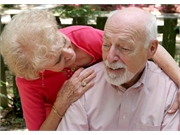THURSDAY, April 30, 2020 (HealthDay News) — The coronavirus pandemic has led many older adults to postpone medical care, a new survey finds.
The University of Chicago survey found that 55% of U.S. adults aged 70 and older experienced a disruption in their medical care during the first month of social distancing.
Thirty-nine percent put off non-essential care and 32% delayed primary or preventive care since social distancing began. And 15% said they delayed or canceled essential medical treatment, the survey found.
“The first month of social distancing in America certainly saved lives, and yet it also created a situation where many older adults are not getting the care they need to manage serious health conditions,” said Dr. Bruce Chernof. He is president and CEO of the SCAN Foundation, an independent charity focused on care of older adults, that co-sponsored the survey.
“As our nation grapples with when and how to reopen, the health care system will reckon with unaddressed medical needs and learn how to maximize new protocols to care for older adults with complex needs in flexible, person-centered ways,” Chernof added in a foundation news release.
The researchers found that older adults are worried about delays in getting support to manage their medical conditions. Many doctors, however, are using telehealth to keep tabs on their patients.
Nearly 25% said that their doctors had reached out to them since the start of the outbreak to check on how they were doing.
More than 20% had a telehealth appointment since the start of the pandemic. And nearly 50% said it was like having a personal visit. Only 4% said it was worse.
Terry Fulmer is president of the John A. Hartford Foundation, a survey co-sponsor. “Health care organizations have stepped up quickly to help older adults get their care needs met with this important technology,” she said.
“Comfort levels with telehealth vary, but we are seeing rapid uptake in both urgent and primary care delivery. The survey results offer a promising glimpse into the future,” Fulmer added.
In all, 83% of older adults said they were ready to self-isolate for several months, if necessary.
A month into social distancing, however, 33% said they felt lonely. To combat it, many were spending more time on hobbies, watching TV, chatting with family and being physically active.
Older Americans also said that health care professionals and non-elected public health officials were the most trustworthy, not elected officials.
The survey of 1,039 adults was conducted April 10 to 15. It has a margin of error of plus or minus 4.28 percentage points.
More information
For more on telehealth, visit the U.S. National Library of Medicine.
Copyright © 2026 HealthDay. All rights reserved.

